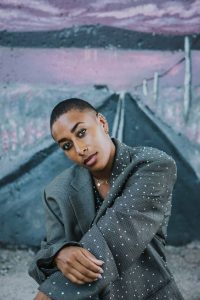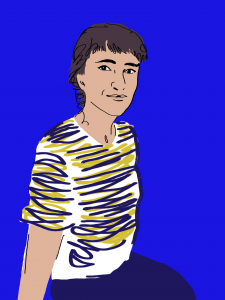It is always interesting to try and articulate actions that arise mostly from an instinctual sense of what is required. Good days in dramaturgical thinking resemble a flow state where we are completely immersed in the work at hand. So having this opportunity to put words to what drives my own process is akin to dramaturgy of self practice.
Each creation project has different goals, different rhythms and different minds therefore requiring different dramaturgical thinking approaches. Even though it is perhaps the most constant aspect of being a dramaturge, I will leave to the side the variability of this role as that has been nicely covered in Jessie Mill’s article published previously by the RQD.
Instead, I’d like to tackle what could be other constants in my dramaturgical process from project to project. Dramaturgy is practiced quite differently from one dramaturge to another. We don’t often have the chance to compare notes, so to speak, so I’m hoping that by naming how I’ve been working it will allow others to offer how they are working similarly and differently.
The most basic constant for me from one project to the next is the desire to be useful. One could even say that’s why the role varies so much. To be useful requires figuring out what is needed and, with all the variables noted above, what we do changes consequently in important ways.
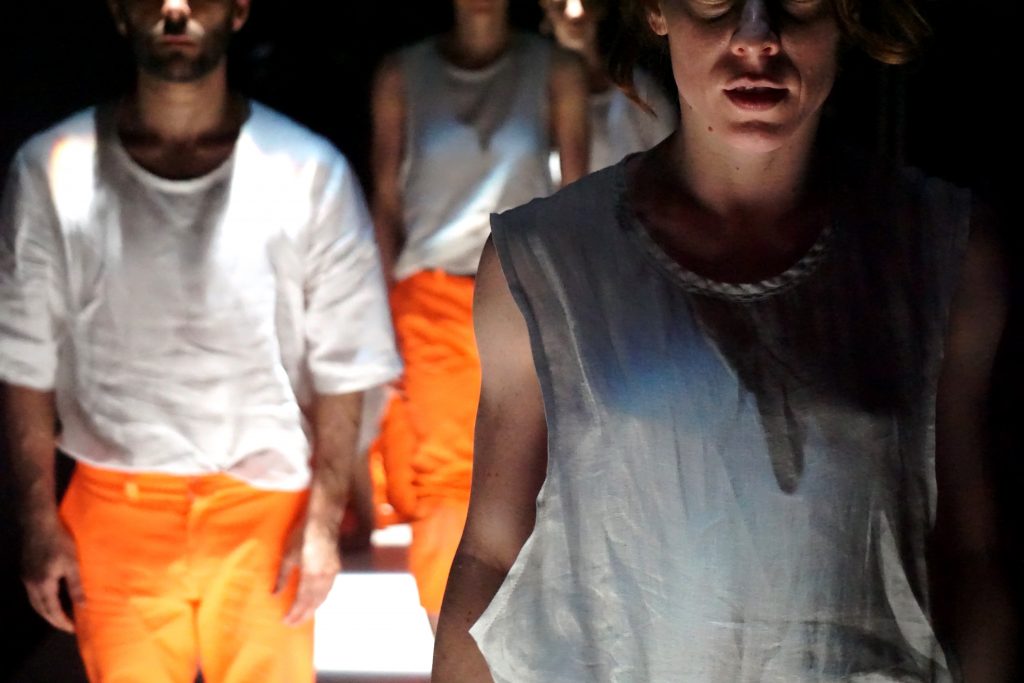
GROUND, avec Rachel Harris, Kimberley De Jong, Brianna Lombardo, Louis-Elyan Martin et David Rancourt © Montréal Danse
Principles
Underlying this desire for usefulness, I can identify some consistent principles. I see them as anchoring the functioning of this usefulness. I’d like to name a few.
The most obvious is creating trust. I suspect all dramaturges prioritize this one. Trust is earned and it takes time. It means spending time together, being familiar with each others work and process styles. I think it is essential for truthful dialogue, expression of doubts and fears and deep questioning.
Equally necessary is the primacy of curiosity and listening. As a dramaturge, I cannot assume knowledge. It can be tempting to think I know what someone means without verifying with them just as it is a trap to think I know where a work is going and become blind to what it is actually doing. I see listening as an active practice of being curious about others, their ideas and their stories. It requires giving time for people to think and creating a safe space for hesitations and doubts.
Another is belief in the creation team, the people at the heart of any process. Works are the result of the people making them with everyone contributing his or her own dramaturgical work in a process. So I see part of my participation in a project is to take care that all voices are heard and that the team has a place to bring their full selves to the process. If I feel my belief in the team is not strong, I must question my ability to properly serve the needs of the project. If I feel a lacking in believe from other members of the team, it is part of my job to address this problem so these fault lines don’t destabilize the working process and undermine moving forward together.
Faith in process is another principle. No one knows where we are going. It’s a wild ride and it requires confidence that even when we lose our way, we will find the means to advance together through trial and error, reflection, occasional “eureka” moments and just plain hard work.
Finally, keeping a distance from choices made seems a necessary position. In the dramaturge role, I am in close proximity to making creative decisions but I also want to maintain a space to question and rethink a piece as new aspects appear. So I need to insure I’m not so close to choices that I become wedded to them, hindering the ability to ponder other options. It is a balancing act of stepping in and stepping out.
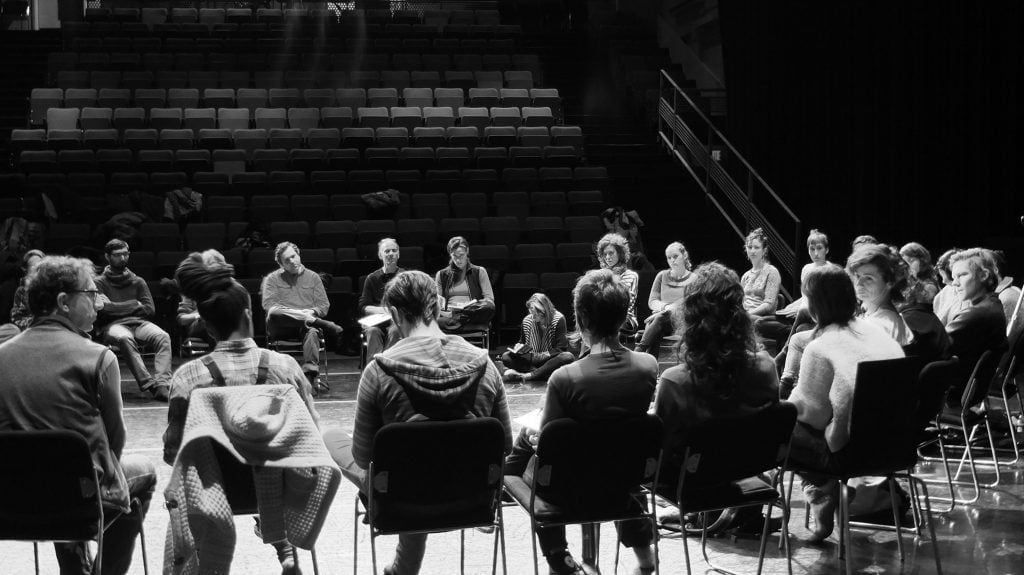
Atelier de recherche chorégraphique © Montréal Danse
Research
In addition to these foundational principles, there are some tools that seem to occur in most projects. I have grouped a number of them together into what I will name here as my process research.
For me, the first is figuring out the languages. It includes the type of vocabulary and references used to talk about ideas and the developing work. I listen for the specific swing of this vocabulary – how, by who and when it is casual, jokey, serious, reflective, forceful, mysterious, etc. Languages also refer to the body, time, space, object, visual, sound and relational languages being investigated. Exploring how my language flow and references can mesh and rebound with these types of languages is a big part of creating trust and working together. The languages of a project evolve over time and require constant attention. It is important to be in synch with the languages used but it can also be useful to shift or question them.
The second is determining the practice of a project. In what way is a group training itself, working together, playing or sharing to create a common understanding that isn’t exactly the creation but is necessary for the creation? Sometimes it’s as simple as exchanging news of the day and getting in synch while other times it can be extensive idea exchanges or a more elaborate body practice. Again, this practice can shift and evolve over time. I think that understanding the deep knowledge of a work involves recognizing these practices. Keeping track of them has proven beneficial to understanding the needs of a project and its roots. Not to mention that sometimes there are practices that get in the way of moving forward and it is useful to be able to name them and probe their continuing utility.
Questions
These researches also nourish and feed into one of the primary means of how I’m trying to be useful which is analyzing what a project is, what it is becoming and what it could become. To listen, to watch, to feel. To facilitate conversations, to be a companion but also to be a destabilizer, guarding a space for confronting alternate ideas. And this leads to asking questions. Questioning a work I see as an absolutely consistent action at the heart of dramaturgical thinking, but it is also the most variable part of the job. The questions of one work are completely different from the questions of another. Nonetheless, I suspect we could trace a history of our field by the types of questions that have been in the air in different time periods. As art making shifts, the spectrum of questions shift.
Figuring out the questions of a work and how to then put these questions into the creation space seems to me the creative task of the dramaturge: Sensing potentials, noticing paradoxes, wondering about relationships, querying about how a work fits into a bigger world picture, navigating the micro and macro dramaturgies of a work in process. This is the fun and the work.
I thought I would take a crack at naming some current question prompts that I keep in my pocket these days. This feels oddly precarious, bringing something to the front door that is usually a back door tactic, as if I’m crystallizing something that is mobile and vast. Nonetheless, I find myself wondering about one or another of them in multiple pieces though rarely in the same way. So here are some questions I may ask of a project: What is it inviting us to do?; Does it know itself too much?; Does it like where it’s living?; Is this its best time framework?; Does it require some consent questions?; Can we defend it and do we want to?.
These kinds of questions (and there are, of course, many more) can be particularly useful as a tool when I or others in the creation team feel either uncertain or too certain! They can be used to encourage cracks for different ideas or approaches to emerge. It is a way to unhook from knowing and stab into the dark. That stab in the dark sure seems to be a constant too.
Dramaturgy is inherent to art making and is shaped by the creative team through their process. The dramaturge is a sometime member of this team that facilitates questioning the emerging dramaturgy of an art project. As I look at this rather tidy listing of constants just made, I think it necessary to say this is a meta-analysis. In actual practice, they appear as untidy, spontaneous expressions of living with and responding to the work at hand.
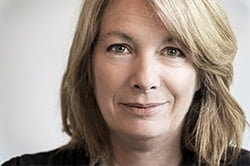
Kathy Casey © Georges Dutil
Kathy Casey
Artistic Director of Montréal Danse since 1996.
Dramaturge for all works of Montréal Danse as well as for projects outside the company.
Facilitator of dramaturgy workshops, choreographic research workshops and concept negotiation workshops in Montreal and abroad.


